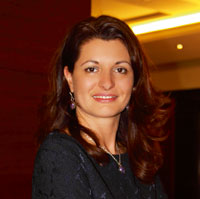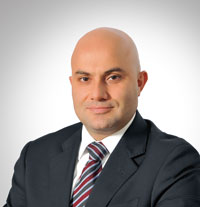IROs in frontier markets discuss investor targeting, governance challenges and a growing appreciation of IR
Telecom Argentina, Argentina
Countries look forward to the day they move from frontier to emerging market status, a sign of economic progress and falling risks for investors. Argentina, however, has been heading in the opposite direction. Index provider MSCI Barra downgraded it to a frontier market in 2009, citing controls on capital flows, with FTSE taking the same step soon after.
Argentina almost fell further two years ago, when President Cristina Fernández de Kirchner nationalized YPF, the oil and gas giant. Both MSCI and FTSE warned that actions undermining investor protection and free-market principles could lead to further downgrades, although South America’s third-largest economy has managed to retain its frontier status with both bodies.
Solange Barthe Dennin, IR manager at Telecom Argentina, says companies cannot deny their zip codes. She’s confident, however, that her firm’s strong track record means it stays attractive to international investors. One of the immediate impacts of a downgrade is that investors without the mandate to invest in frontier markets must get out of the stock.
But some institutions get round this by tweaking their products. ‘Since 2009 you have many funds that, in order not to lose potential investment, have created specific funds in order to invest in frontier markets,’ explains Barthe Dennin.
She became head of IR in 2008 and runs a four-strong team reporting to the head of finance. Given a recent uptick in investor interest, her IR calendar looks particularly busy this year, with plans to participate in around 10 conferences.
‘Investors are telling us they are willing to reanalyze the possibility of investing in Argentina,’ she says. ‘This year we have been more on the radar of investors, so there’s been higher demand for conferences or visits to us.’
That’s in contrast to the months following YPF’s nationalization, when investors wondered which other previously stated-owned companies might fall into government hands, pushing down Argentina Telecom’s stock price. The firm was formed in 1990 when the government privatized state operator Entel and split it in two, handing France Télécom the northern part of the country.
For Barthe Dennin and her fellow IROs in Argentina, the professional resources on offer remain slim compared with many emerging markets. ‘The IR community is small and there is no national association,’ she says. The small size, however, means ‘we know each other pretty well, and therefore maintain fluent contact.’
Monbat, Bulgaria
Sofia-listed Monbat, a manufacturer of automotive batteries, couldn’t have hired a representative more enthusiastic or dedicated to the IR cause. Daniela Peeva, the firm’s IRO of seven years, is chair of the Association of Bulgarian Investor Relations Directors, which was set up in 2005, two years after the local regulator made it mandatory for listed firms to have an IR function.
She is also a member of the Bulgarian National Corporate Governance Committee, which was established in 2010 following the creation of a governance code in 2009. ‘As an IR director, I report directly to the board,’ she says. ‘I attend all meetings and participate in some decision making in an advisory capacity.’

Daniela Peeva, Monbat
‘Since last year, all our regulatory information has been disclosed on Facebook’
Although Monbat’s stock is ‘one of the most liquid positions on the Bulgarian Stock Exchange (BSE)’ and a constituent of all the main indices – including CGIX, the corporate governance best practice index – it wasn’t spared the impact of the financial crisis.
The shares plummeted to a low in 2009, prompting an aggressive five-year buyback program to stabilize the share price. The recent resale of those treasury shares was, according to Peeva, a great opportunity to ‘extend and enrich’ the firm’s capital structure. To attract new shareholders, she uses ‘conventional methods’ – investor meetings, exhibitions and conferences – but Monbat does not do roadshows.
In addition to its good corporate governance and strong financial performance, Peeva believes its ‘consistent policy on disclosure and transparency’ puts Monbat ahead of other firms. ‘In 2008 we pioneered disclosing financial results on a monthly basis,’ she says. ‘This has been highly appreciated by current and prospective investors.’
Social media also plays a part in the IR program: ‘Since last year, all our regulatory information has been disclosed on Facebook.’
If Bulgaria is somewhat off investors’ beaten track, its capital market is ‘fully developed, with a regulated securities market, a sufficient number of investment intermediaries, local institutional investors, a regulator and a central depositary.’
With procedures for attracting new debt and equity investors still ‘quite heavy and formalized’, however, Bulgarian issuers tend to rely on bank loans rather than capital markets to finance their development. Peeva also says the country remains ‘unattractive to foreign investors due to a lack of liquidity and a scarcity of financial instruments. And there are very few IPOs.’
She points out that IR has nonetheless become ‘a leading corporate function’ at most listed companies, and that Bulgarian regulations are made to be fully compliant with EU legislation.
In that regard, she is keen to highlight her firm’s achievement in setting new standards: ‘In 2012, the BSE recognized Monbat as the issuer that had made the highest contribution to the development of capital markets in Bulgaria.’
Access Bank, Nigeria
‘There have been a lot of things going on in Nigeria recently,’ enthuses Catherine Okwara, IRO at Access Bank, one of the country’s top 10 financial firms. ‘We have just rebased our economy, which is now the biggest in Africa and ranks 26th in the world. The Nigerian Stock Exchange, one of the mature markets in the sub-Saharan region, with a total market cap of NGN12.5 tn ($77 bn), has actively improved its level of transparency. There’s also been a recalibration of the banking system and this has set the tone for higher investor confidence.’
Okwara supervises all daily aspects of the bank’s IR plan, working with Tobi Akinbiyi, head of strategy and IR, and a team of financial analysts. Access Bank was a wholesale bank before its tie-up in 2012 with Intercontinental Bank, which has brought in a sizable retail consumer base.
The team sits down with management to discuss strategic planning and diversification of the shareholder base, which is 65 percent local investors and 35 percent international, and equally split between institutional and retail. ‘Whichever way our strategy tends to tip along for the year, we will target value, growth or GARP investors accordingly,’ Okwara says.
‘The scope of what my team’s doing has been growing, as has our level of involvement in discussions at management’s table: we frequently review updates on investor perception and investor sentiment – or what’s going on the industry –with our CEO.’
The Nigerian banking industry has to report in IFRS and there are guidelines on the timing of results announcements. This has allowed IR departments to gain ‘an elevated position’ from what was previously more of a financial control function. ‘Accounting standards and the level of transparency and disclosure vary across African regions,’ explains Akinbiyi. ‘You’ll also find some organizations adhere more to international standards than others.’
‘Nigerian companies have come to understand the importance of having an IR program, in order to align investor expectations with corporate goals, because out of that comes your capital,’ adds Okwara, who originally worked in corporate communications at the firm. ‘I was lucky to be around when IR activity was just budding, so I was part of the team that grew the desk into a fully fledged function.’
If the role of an IR manager has ‘become a bit more competitive’, the profession has yet to be regulated in Nigeria. But Okwara says there have been ‘increasing discussions about establishing an IR body’ in the country, which she hopes will happen sooner rather than later. ‘Even so, we typically align our communication strategies with those of our international peers, using guidance from NIRI and the UK’s IR Society,’ she says.
Al khaliji, Qatar
[Qatar was upgraded from a frontier market to an emerging market on June 2, 2014.]
It’s an exciting time for Qatari investor relations. The oil-rich Gulf state is set to be upgraded from a frontier market to a more investor-friendly emerging market in June. It is also preparing to become the first Arab country to host the football World Cup in 2022, a sporting event that requires vast infrastructure investment as well as thrusting any host nation into the spotlight.
Dr Joe Maalouf, head of investor relations at Al Khalij Commercial Bank (al khaliji) and chairman of the Middle East IR Society’s Qatar chapter, has been preparing for the influx of foreign investment Qatar’s upgrade is expected to bring. He’s not alone in his pre-reclassification preparation. ‘Part of the support from the Qatar Exchange is about helping companies understand exactly what it means to be listed – especially in terms of IR,’ explains Maalouf.
‘We want to tell people about the advantages of having IR at their firms. We want to reach a point where IR is mandatory and management believes in it. We feel good IR is reflected in [a company’s] shareholders and in the share price. [Following the MSCI reclassification] we might see a lot of IPOs, which means a requirement for more IR if we really want to be open to international investors.’
At time of writing, al khaliji – which is 47 percent owned by the Qatari government and 21 percent by retail shareholders – had only 42 public compatriots listed on the Qatar Exchange. Its most recent listing, however – and the first since 2010 – was a roaring success, with Mesaieed Petrochemical surging 400 percent on the first day of trading back in January.

Dr Joe Maalouf, al khaliji
‘We want to reach a point where IR is mandatory’
The country’s reclassification is also likely to shine a spotlight on corporate governance, concedes Maalouf, though he says al khaliji is setting the example in this respect. ‘We’re already at the head of corporate governance [in Qatar],’ he says. ‘We have seven board members – two of whom are independent – and we have a very professional senior management. Success, based on our pre-planned strategy, has been achieved.’
When Qatar’s upgrade comes into effect, it – and the United Arab Emirates – will be the first Gulf countries to cross from the frontier markets classification. This may be a positive sell for Qatar, but instability in the region also has an effect on Maalouf’s IR program.
‘The political tension in the region has caused some investors to lose their appetite [for the Middle East] – for instance, people have maybe lost their appetite to invest in Egypt for now,’ Maalouf explains, adding that he had to cancel a conference in Turkey in May because of ongoing tensions in the country.
Then there’s the World Cup influence. Despite criticisms of the desert nation’s winning bid – not to mention the human rights questions that have been raised – the world’s biggest football tournament has brought a building boom, with about $200 bn of projects already started or in the pipeline, according to an estimate by the Middle East Economic Digest.
‘All our success and innovation – and to be honest, all of Qatar – is based on Qatar spending and government projects,’ says Maalouf. ‘So the 2022 World Cup has definitely attracted more businesses and more investors.’
All these changes have forced Qatari IR to evolve at a fast pace. ‘In the last three years I have seen a big improvement in Qatar in terms of investor relations,’ says Maalouf – who believes things can only get better.










